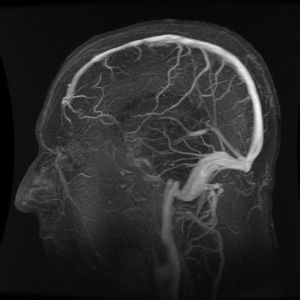Some Risk Factors for CCSVI Similar to Those for MS
Several risk factors for chronic cerebrospinal venous insufficiency are also risk factors for multiple sclerosis, finds a new study.

Several risk factors for chronic cerebrospinal venous insufficiency (CCSVI) are also risk factors for multiple sclerosis (MS), finds a new study. The study, carried out at the State University of New York at Buffalo, was published in PLoS One earlier this week.
CCSVI involves reduced blood flow from the central nervous system to the periphery, and a hypothesis holds that this involves narrowing of veins that restricts blood flow to the brain and alters brain drainage, possibly contributing to brain tissue injury associated with MS. Possible connections between CCSVI and MS have been the subject of great controversy in the medical community. Initial findings that CCSVI overlapped perfectly with diagnosis of MS have not been reproduced in subsequent studies, and CCSVI-related abnormalities have been found in healthy controls as well as in patients with neurological diseases other than MS. In addition, the researchers write, some have pursued “interventional procedures in the treatment of CCSVI-related abnormalities without established safety and efficacy outcomes.”
In the first phase of the Combined Transcranial and Extracranial Venous Doppler (CTEVD) study, which included 499 participants including those diagnosed with MS, those with other neurological disorders, and controls who had not been diagnosed with any central nervous system disorder, CCSVI prevalence was found to be 56.1% in MS patients, 42.3% in those with other neurological disorders, 38.1% in patients with clinically isolated syndrome, and 22.7% in controls. Another recent study found a CCSVI prevalence of 36% in controls.
The current study investigated risk factors for CCSVI in 252 CTEVD study participants without known central nervous system disorders. The results showed that, compared to those without CCSVI, those with the condition were 2.7 times more likely to have had infectious mononucleosis, 3.9 times more likely to have irritable bowel syndrome, and 1.98 times more likely to have a history of smoking. All three are also risk factors for MS. The researchers note that the association between CCSVI and infectious mononucleosis is particularly interesting as infection with Epstein-Barr virus (which causes infectious mononucleosis) is the most important risk factor candidate for developing MS.
The study also found that those with heart disease are 2.7 times more likely to have CCSVI and those with heart murmurs are 4.9 times more likely to have it, though neither of these are known risk factors for MS. In addition, it found that those taking dietary supplements for at least three months (especially ginkgo biloba) were less likely to develop CCSVI.
“Our results suggest that risk factors for CCSVI in this group of volunteers are remarkably similar to those of possible or confirmed importance to MS, but we do not yet understand the whole story,” said the study’s senior author, Robert Zivadinov, MD, PhD, professor of neurology at the University of Buffalo School of Medicine and Biomedical Sciences, in a press release.